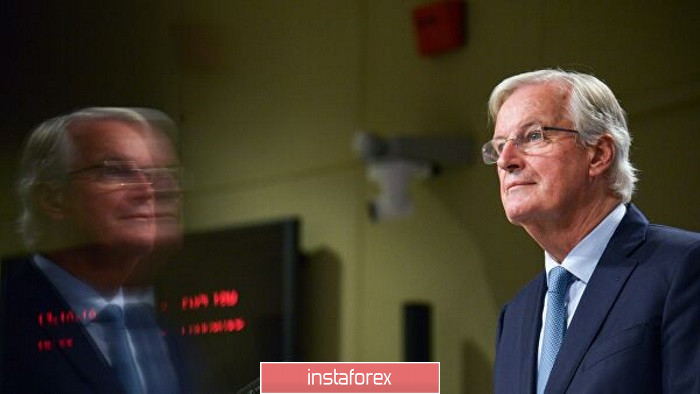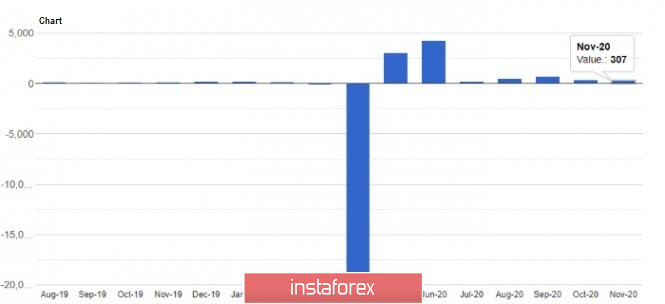The euro may reach the 21st figure soon, especially since demand for the US dollar is declining due to weak data on the US labor market. Clearly, employment in the US is slowing amid the persistent second pandemic wave.
The recent statements of Fed Chairman Jerome Powell also did not give optimism to dollar bulls, since they hinted of a large stimulus package and long-term support from the Central Bank. In this vein, there is no need to hope for any increase in interest rates.

In his speech, Powell repeated his earlier statements that the government should do more to help the labor market, small business and local authorities. Accordingly, he promised that the Fed will continue to provide support to the economy until it no longer needs it. In terms of a positive outlook, real change will take place only after a COVID-19 vaccine is available.
Meanwhile, US Treasury Secretary, Steven Mnuchin, was criticized by Democrats who could not forgive him for deciding to end a number of lending programs. According to Mnuchin, a $ 2 trillion package in March prevents him from extending five emergency lending programs, and in addition, he believes that those are not needed anymore. He said the released funds can be used more effectively within the framework of other incentive programs. For their part, the Democrats felt that Mnuchin misinterpreted the legislation, but they failed to change his decision.
On December 31, the United States will cease to operate lending programs for the corporate and municipal sectors, as well as the program to support lending to small and medium-sized businesses. Meanwhile, four other programs that support the functioning of the liquidity mechanism have been extended until this spring. These include payroll retention programs, the program to support the short-term corporate debt market, as well as the program that allows loans to primary dealers, providing them with a wider range of assets to secure debt obligations.
Anyhow, on the topic of economic statistics, the US released data on its labor market yesterday, which definitely put pressure on the US dollar. According to the report published by the ADP, jobs in the private sector increased by only 307,000 in November, which directly speaks of a slowdown in the rate of hiring. The Economists had expected the figure to increase by 475,000.

In the data, the most active jobs were created in medium-sized companies, followed by small businesses. The least number were from large companies. Surprisingly though, despite the second coronavirus outbreak, most jobs were created in the service sector. It seems that the absence of restrictive measures made the service sector feel more free, in contrast to what is happening now in the EU.
Today, a number of PMI reports will be released for Europe, UK and the US, which will make the picture become clearer. With regards to the labor market, the US Department of Labor will publish its official November employment report tomorrow, where the number of non-farm jobs is expected to rise by 440,000, as the unemployment rate fell from 6.9% to 6.7%.
As for other less important data, they did not give much impact to the US dollar, even though they showed weakness. One report was from ISM New York, which said that business activity declined significantly in November, dropping to a 3-month low. Current business conditions, meanwhile, fell to 44.2 points, from 65.1 points in October.
Many Fed representatives also delivered speeches yesterday, but generally, all of them were talking about the same thing: the US economy is still in a very deep recession, and despite some recovery, a new wave of COVID-19 will negatively affect activity. Everyone is looking forward to a vaccine, as only by its appearance will the situation improve. No one spoke much about the future of monetary policy, and this suggests that the Fed has not decided on it yet, so perhaps, the central bank will tackle it at its meeting this December.
With regards to the EUR/USD pair, movement depends on whether the quote will manage to break above price level 1.2135, as only by that will the euro be able to reach the levels 1.2200 and 1.2260. But if the quote drops to 1.2090 instead, the euro will collapse to the lows 1.2040 and 1.2000.
GBP/USD
Yesterday, French authorities said they could veto the trade deal between the UK and the EU if they don't like the terms. Many European leaders seem to dislike the idea that EU chief negotiator, Michel Barnier, will be the one to make concessions in order to reach a deal.
According to France, although pressure is being exerted to the EU, it is unacceptable to make concessions to reach an agreement. Barnier rejected the request from EU officials to see key parts of the agreement before it was prepared, so many expressed their outrage and said that this was done on purpose to leave too little time for a thorough study of all the nuances of the agreement.
Against this, the pound dropped sharply, but then it recovered quickly, as optimism and expectations of reaching an agreement at the last moment sparked investors' appetite, especially after such an attractive decline.
On the technical side, everything is the same in the GBP/USD pair, but a breakout of 1.3435 will lead to a new upward move towards 1.3510 and 1.3605. If an agreement is not made by the end of this week, the quote may break below 1.3295, which will lead to a collapse to 1.3200 and 1.3110.





















